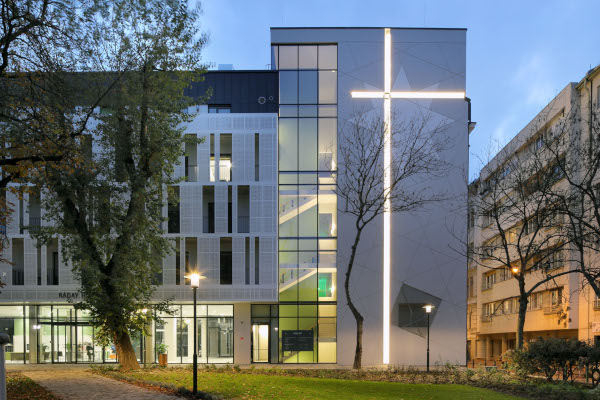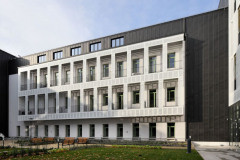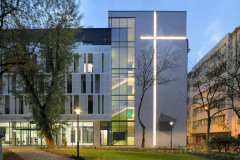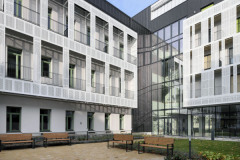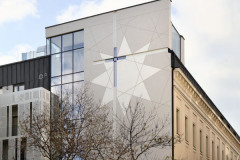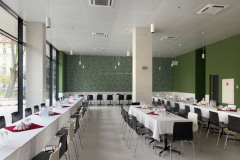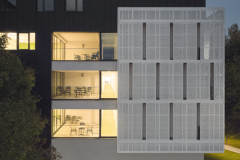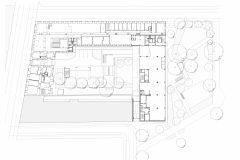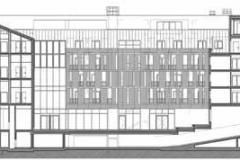Fruits of the Soul
Ráday House, Budapest
Architect: Zoltán Berzsák
Text: Zoltán Dragon
Photos: József Hajdú
This year saw the inauguration of the Ráday House, which may be referred to as a Calvinist centre including the Ráday Students’ Hostel, the Faculty of Theology of Károli Gáspár University of the Hungarian Reformed Church, the Library and Bible Museum of the Ráday Collection and the Bishop’s Office of the Calvinist Diocese of Dunamellék. In his designs, the architect, Zoltán Berzsák was faithful to the building’s historical past, while at the same time specially treating the architectural layers of the building as witnesses of history. The building is an authentic imprint of history, carefully preserving the heritage of the barracks, the tobacco factory and the property boundaries that have been evolving here since the mid-18th century. The modern history of the block began with the removal of the tobacco factory, when the Calvinist Church bought the site to build a home for the Ráday Collection it had purchased. Back in those days, the site was envisioned as a multifunctional building, housing a dormitory, a pastoral training centre, a museum collection and the bishop’s office. In the latter half of the 20th century, this dream was made complete and extended by a modest framework structure to enclosed the wing of the college facing the square. On its extension, the architect, István Szabó guided students to the dormitory wing through the gate of the old building, enlarged the banqueting hall above the gate, and demolished the cupola topping the buildings as well as the ornamentation. However, he did not revise the many layers of functions that had been integrated into the building, and over the decades its use became increasingly difficult, with more and more compromises and improvised alterations. The current remodelling was designed to overcome these disharmonies. The framework of the future building was developed in co-operation with the users: their dialogue defined the relationship between the functions as well as the exterior of the building.
Client: Dunamelléki Református Egyházkerület
General planning: 4 plusz Építész Stúdió
Leading architect: Zoltán Berzsák
Fellow architects: Katalin Konyha, Csongor Csintalan†, Eszter Seres, Noémi Rácz, Dorottya Szvák, Barna Berzsák, Blanka Eperjesi
Historical elevation: Miklós Gerák
Interiors: Erika Ignácz
Garden, landscape: Franciska Tézli-Szabó
Graphic signs: Eszter Zetelaki
Structure: Balázs Puskás, Márton Kerényi
HVAC: Norbert Érces, Levente Herczeg
Electrical engineering: Gábor Kánai , Barnabás Kánai
Lights: Nóra Károlyi
Fire protection: Gergő Érces
Acoustics: Andor Tamás Fürjes
Environment protection: Gábor Bérczi
Traffic: Zsolt Szabó
Elevator: Csaba Benka
Kitchen technology: Gergely Földi
Building automation: Tamás Bundy
Entrance RFID: István Sipos
Project managers: László Seres, Evelyn Csilla Mátyás
Main contractor: Laterex Építő Ltd.
